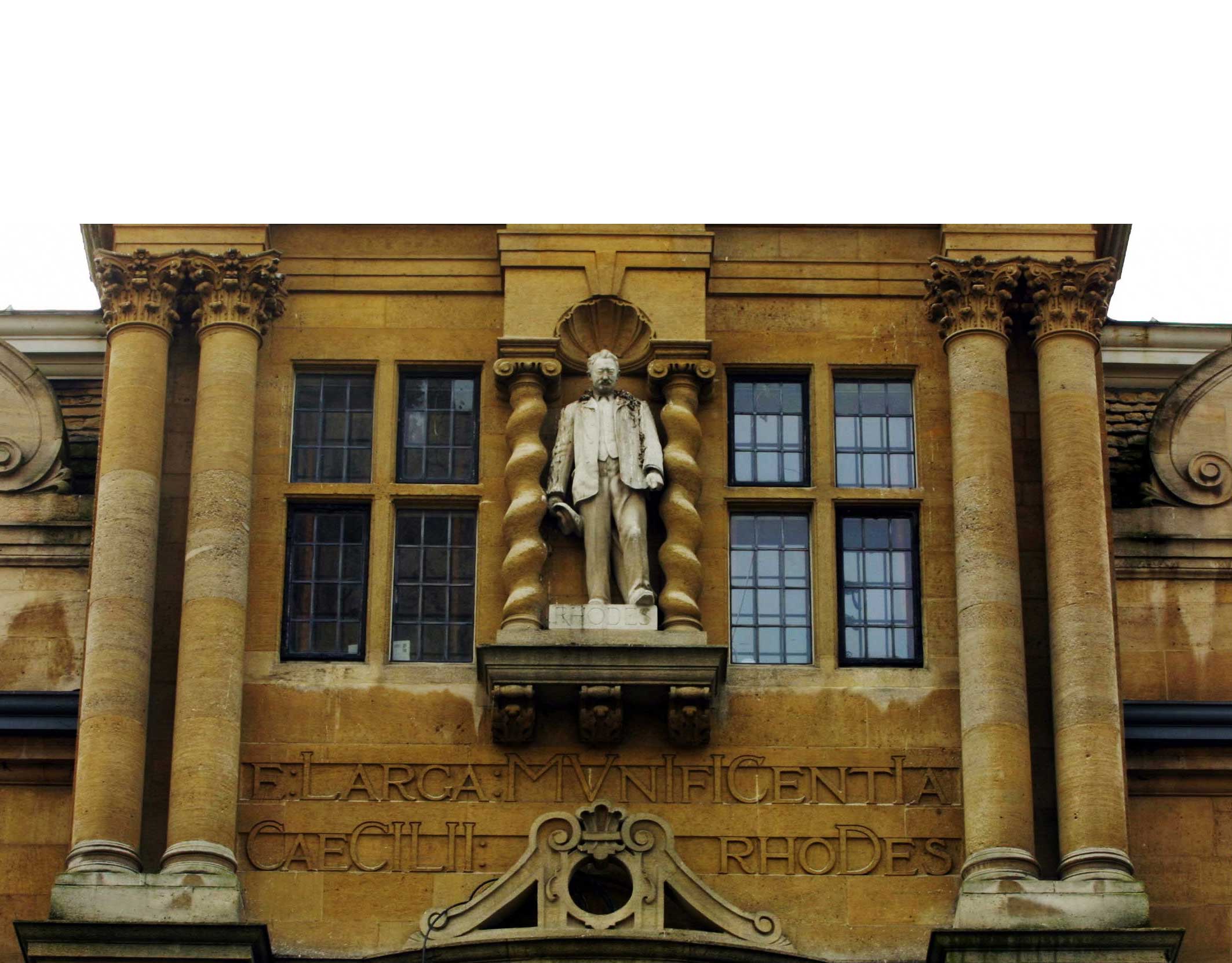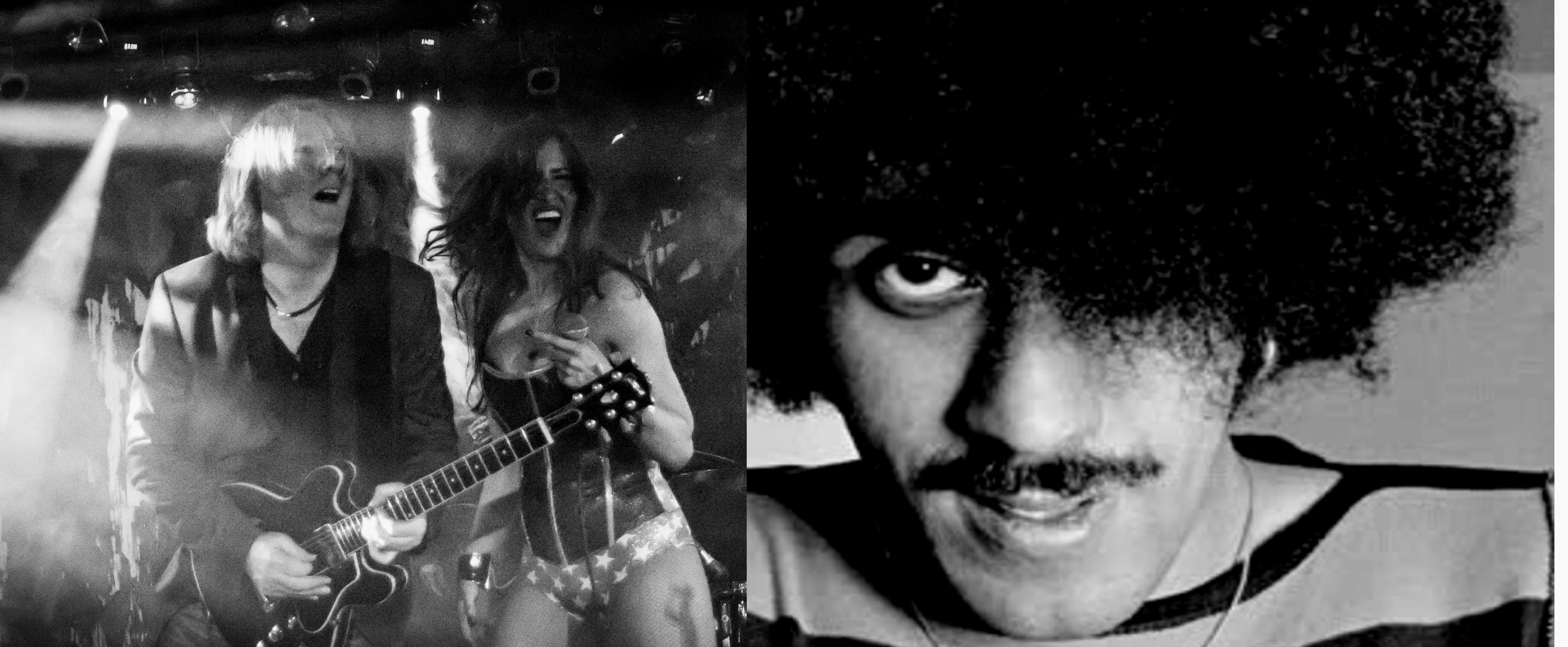
How Thin Lizzy Inspired Single for Duchess’s Charity
January 3, 2016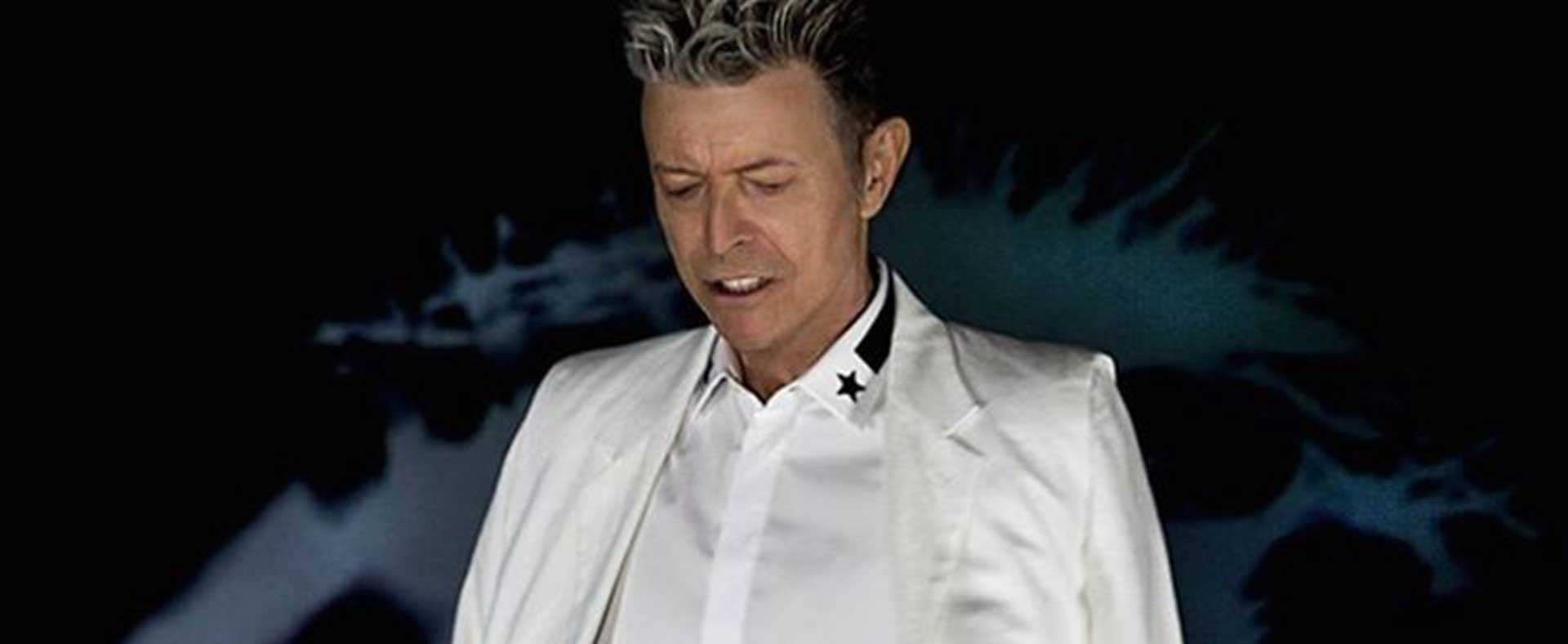
Black Day, Black Star
January 12, 2016Dante enters the heated debate on memorials and memories
By Mark Beech, Dante editor
A little local difficulty about a statue of Cecil Rhodes has opened up a whole debate about history.
What are statues and memorials for? What do they say about the present’s relationship with the past? What does a statue commemorate – the person or what they stood for? (I say “person” but let’s face it, most statues are of men, particularly white, middle or upper class, often Oxbridge-educated. Like Rhodes.)
Do we commemorate their principles at the time of their lives (since many statues are for recently dead people) or now? What if our values change over time? Should we then remove statues we find offensive or should we be respectful of the past? What if a statue commemorates someone lauded in their time but now known to have less desirable characteristics?
This article mentions many historical figures, some good, some bad. It should be made clear that we are drawing absolutely no comparisons between them except that all have been memorialised in some way. It is not to conflate the argument, just to flag up a wide range of issues under debate.
Many countries have statues of monarchs and statesmen, soldiers or military leaders who conquered empires, won wars or ruthlessly subdued groups in order to keep power. Some were national heroes. Some became so though virtual genocide. Should we now remove them? Vilify them? Or keep the memorials and educate people on what their good and bad achievements?
Elizabeth I and Henry VIII would not be memorialized anywhere. Or the Duke of Wellington or Napoleon. Winston Churchill, seen by some as the greatest of Britons, would possibly fail this test– the statesman led the country through World War II, when bombing was the only response to bombing. Some recent revisionism has suggested the Dresden blitz response to London attacks was unnecessarily brutal, while he still is held responsible by some for the actions of troops he called in to quell unrest in a miners’ strike 30 years before. To this writer he is still a figure who deserves commemoration more than almost anyone else in history, but there are others who argue to the contrary. Is this political correctness pushed to illogical extreme?
Germany has no statues to his opponent, the evil Adolf Hitler; one might assume that if the unthinkable had happened and he had won, images of the dictator would have been all over his conquered countries too. Statues of Mussolini, Lenin, Stalin, Muammar Gaddafi and Saddam Hussein were soon toppled after their falls.
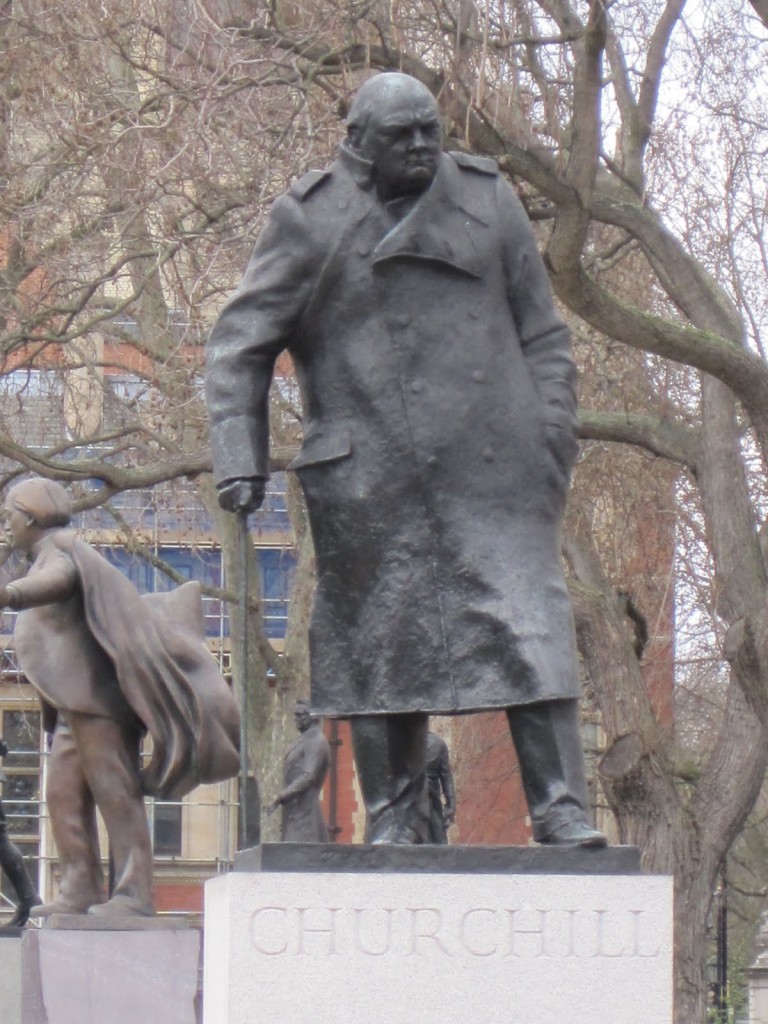
Campaigners argue that if Rhodes falls Churchill will follow. The statue is in London.
A whole book could be written about statues of British Prime Ministers. Parliament Square in London has Churchill in pride of place, with the exceptional Ivor Robert-Jones memorial facing Big Ben. Lloyd-George is also there, along with some 19th-century statesmen who perhaps hold less of a claim such as the Earl of Derby and George Canning, who was Prime Minister for only four months, the shortest tenure ever.
How long before there are complaints about the statue of South African premier Jan Smuts, which is there? Abraham Lincoln and Nelson Mandela are also present, despite some criticism that the Square should commemorate British politicians. Either way, their respective roles in ending slavery and apartheid seem likely to make their places secure for a long time.
Margaret Thatcher, Britain’s first and so far only female Prime Minister, who won three elections, fought the Falklands War and was in office for a pivotal decade, has nothing, apart from memorials include parliament: she has been seen as too controversial and divisive.
There are statues of Queen Victoria all over London, Britain and former Empire countries. By contrast, and sadly, there are rather fewer of Queen Elizabeth II, despite her having an outstanding and distinguished reign which has now lasted longer than Victoria’s: one of the problems is that there is new public sensitivity to spending public money on memorials. Every time one is proposed, there is an outcry about the money, with questions being asked on how many hospital wards could be built instead. All this is to say that zeitgeist is important in the proposal and creation of any memorial – and also in its retention. Which brings us back to Cecil Rhodes.
The controversy was started at the University of Cape Town last year. Students there protested that the memorial to him was wrong. The statue was subsequently removed.
Now the row has extended to the statue of Rhodes on the High Street side of Oriel College in Oxford.
The college has been consulting on whether to keep the statue, with the next phase of talks due in February. The statue is high up on a listed building, so council approval would be needed for its removal, but that may be a technicality.
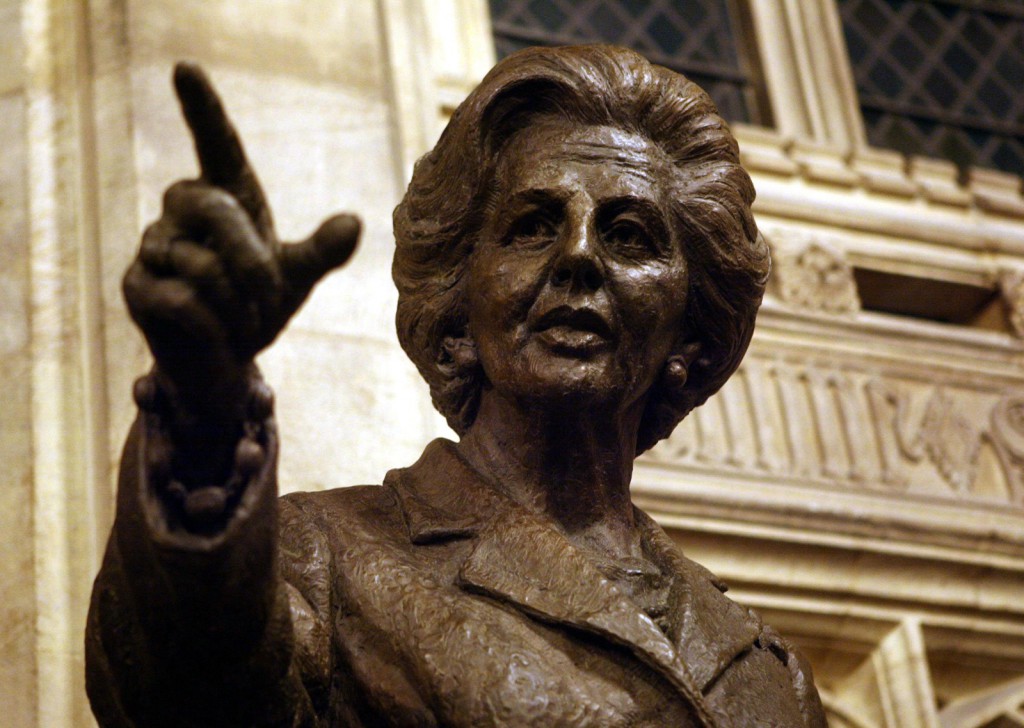
Margaret Thatcher statue in London’s parliament. Other memorials to the only U.K. female Prime Minister have been attacked.
Below we print some of the arguments of both sides.
In summary, on the one side (“Rhodes Must Not Fall”), it is said that the De Beers founder was a product of his times, one of the greatest businessmen and politician, an extremely wealthy visionary who was lauded in his lifespan. His Rhodes Trust and scholarship scheme is invaluable and benefitted thousands of students from poor countries who would never had a chance to come to Oxford otherwise.
(The writer has a lot of sympathy for this part of the case. Yes, the scholarships helped a lot of comparatively well-off students like U.S. President Bill Clinton, singer Kris Kristofferson, Australian premiers such as Malcolm Turnbull, Tony Abbott and Bob Hawke. The awards also helped friends of mine from Africa and India who were given life-charging opportunities. The Rhodes House is one of the most stunningly beautiful of Oxford buildings. It used to have a breath-taking library and ancient clock with a hypnotically slow tick I remember always running a few minutes slow. That might say it all. Rhodes supports world-class research. But I digress.)
On the other side (“Rhodes Must Fall”), it is argued that Rhodes was a colonialist, a racist, a bully, a bigot and even a mass murderer. For any or all of these reasons, the statue commemorates something repugnant and must go.
It could be respectfully argued that both sides miss the point that whether the statue is there or not, racism will remain. That period of history should not be whitewashed (word choice intended), erased or airbrushed away but studied to learn lessons of the future. Not that the removal of a statue implies censorship elsewhere of the history books.
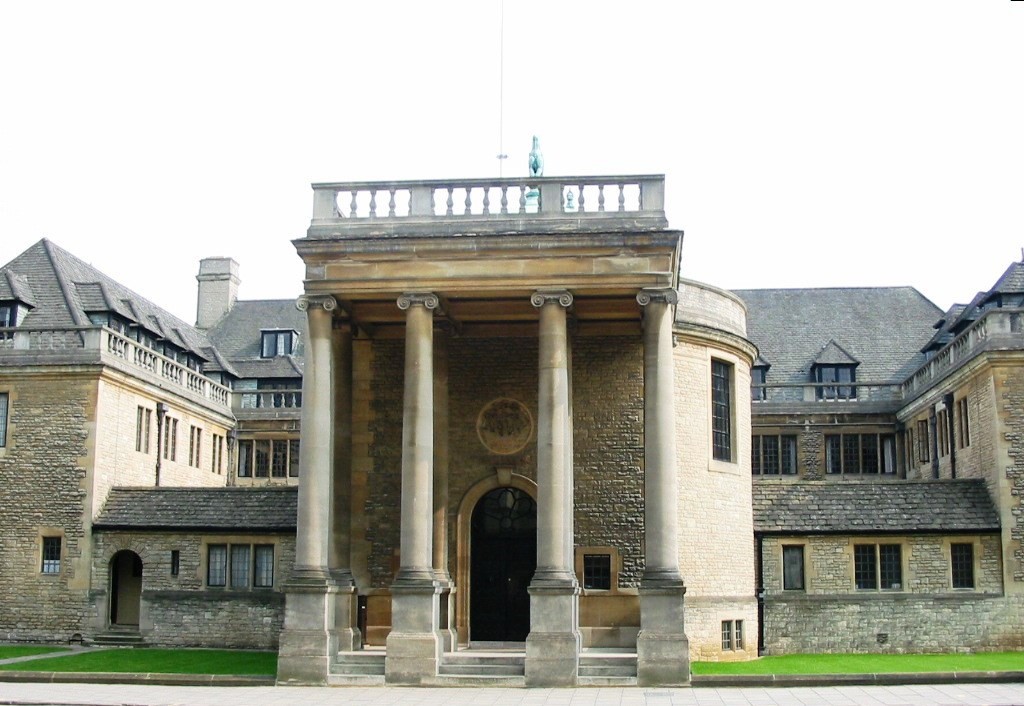
Rhodes House in Oxford. The Rhodes Trust has helped thousands of students from poor backgrounds to gain a university education.
We can even commemorate colonialism as long as we are aware of its background. So much around Oxford stems from the wealth of empire and colonialism – some of the college buildings and wealth, items in the Ashmolean, the Codrington library and Pitt Rivers museum. We simply can’t get away from that.
If it is taken away, the statue will no longer offend those who think Oxford is besmirched by Rhodes. It will also look much like an insult to Rhodes Scholars – “oh, you have taken money from a racist murderer.”
We may conclude a statue is rarely a memorial just to the man, it is often to his life and values. But by this token it is a memorial both to values we might see as questionable as well as to the excellent legacy he has left. Does one not go a long way to cancelling out the other?
Despite all this, I am purposefully not drawing a conclusion. That is for Oriel and others to do. But I hope we can continue this debate in a civilized manner. It ill befits Oxford to resort to personal abuse when discussing the issue. This was, I was taught in philosophy tutorials, an “argumentum ad hominem” – to attack one’s opponent personally rather than the view being expressed. Those in favour of Rhodes are not automatically racists. Those who want his removal are not automatically obsessed with political correctness.
Here are the two arguments, printed as written. Those with strong views can click on the respective petitions and sign them if you agree.
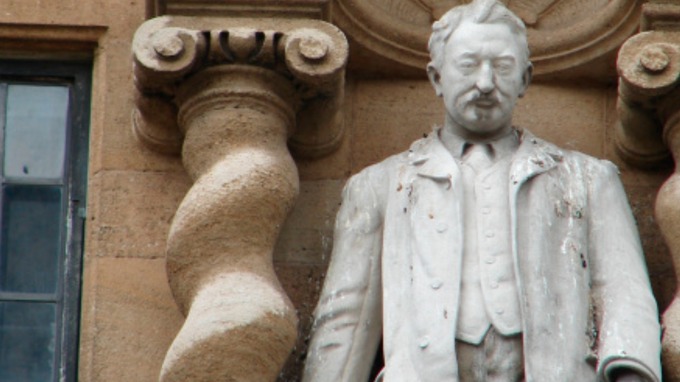
A closeup of the Rhodes statue. – ITV stream
RHODES MUST FALL
By Johannes Weiss
I thank the Dante editor for his open fairmindedness in asking for this piece after his own introduction which sets the context well.
Cecil Rhodes had two sides. First he was an enlightened despot. He gave generously, yes, but partly did this simply so that he was better regarded. True, it is possible to find many quotes that show him as a lover of all human beings, black or white.
But, second, above all, he was not a cultured man. He was a brutal man. He protected his empire with a paramilitary police force. He became rich by theft. He grabbed land, silenced critics and used a private army to kill those who stood in his way. Black people were corralled into special reserves and his apartheid system was so rigid it outlasted the damage of U.S. slavery to scar the continent right up to De Klerk, who, richly, is trying to defend it even now. He would say that, wouldn’t he?
There are rather more Rhodes quotes that are offensively disparaging to those of colour.
The removal of the statue would mean students and others no longer have to uncomfortably gaze at a white supremacist. But it is not erasing history, any more than the removal of Hitler statues means we do not study his atrocities. Removal means we can concentrate on Rhodes as a criminal with his crimes better known.
Personally I think the Rhodes Trust has also had its day and should be renamed, but I know others, including Rhodes Scholars, are just campaigning for the statue to go. The same applies too to South Africa’s Rhodes University. It is time it renamed too.
Rhodes did not spend much time at Oxford, which is a shame because if he was there longer he might have learned more about basic humanity and decency.
We have already removed many legacies of Rhodes. He once owned Rhodesia, now Zimbabwe and Zambia, pretty much, and even that renamed, though it isn’t much better off now.
Why not take down a second-rate statue on Oriel, one of the greatest Oxford colleges which can now proudly move away from one student who was once famous and fantastically rich and is now just a fantastic embarrassment?
We, the undersigned, call upon Oriel College to take down the statue of Cecil Rhodes that sits overlooking the High Street. This statue is an open glorification of the racist and bloody project of British colonialism. An architect of apartheid in Southern Africa, Rhodes is the same apartheid colonialist who said: “I prefer land to niggers…the natives are like children. They are just emerging from barbarism…one should kill as many niggers as possible.” Rhodes’s actions in Southern Africa were informed by this philosophy, and in putting his murderous colonial project into practise – he committed a multitude of crimes that deserve international outrage instead of tacit complicity.
We find it deplorable that Oriel College continues to glorify an international criminal through its uncritical, deeply violent iconography. As long as the statue remains, Oriel College and Oxford University continue to tacitly identify with Rhodes’s values, and to maintain a toxic culture of domination and oppression. We believe that the colonialism, racism and patriarchy this statue is steeped in has no place in our university – which for many of us is also our home. The removal of this statue would be a welcome first step in the University’s attempt to redress the ways in which it has been an active beneficiary of empire. While it remains standing, the statue of Rhodes remains a celebration not just of the crimes of the man himself, but of the imperialist legacy on which Oxford University has thrived, and continues to thrive. While the statue remains standing, Oxford University continues to condone the persistent racism that shadows this institution.
At the University of Cape Town, the statue of Cecil Rhodes has fallen and uncritical memory of his legacy has been discredited. It is at the University of Cape Town where the Rhodes Must Fall movement, a student-led movement to decolonise education, challenges the active influence of colonial relations in Africa, and caused the removal of the statue of Rhodes that overlooked the campus. Rhodes Must Fall in Oxford supports and continues this vital work by looking to critically interrogate the colonial relations on which Oxford University is founded, not just in Africa, but worldwide. We see no reason why here, at the heart of the High Street, at the heart of Oxford, Rhodes cannot also fall.
For centuries, the University of Oxford has produced, profited from, and memorialised the violent conquests of Rhodes and other ‘great’ imperial men including Christopher Codrington, Benjamin Jowett, and Augustus Pitt Rivers. The University is strewn with visible symbols of its colonial inheritance, and remains the intellectual heart of unjustly attained global privilege. At Oxford, those whose histories have been marred by imperialism are shadowed by statues of their oppressors as they walk through their own university, and find their history held hostage within the archives of their oppressors. Here, a growing number of students are pained by the absence of legitimate critical means to articulate their experiences, and excluded from a culture rife with colonial apologism.
This exclusion violates the university’s own purported commitment to “fostering an inclusive culture which promotes equality, values diversity and maintains a working, learning and social environment in which the rights and dignity of all its staff and students are respected”. Whilst we emphasise that we do not wish to be included in a structure that remains violent towards us, that we, as agents, will continue to agitate for its reformation, we wish to highlight that having a statue of Rhodes violates even this low threshold, and provides a sufficient basis for its removal.
The University of Oxford continues to colonise the minds of future leaders through its visual iconographies, the concepts and histories on its curricula, the gross underrepresentation of people of colour and other marginalised groups in its staff and student community, the exclusionary networks of power, the cultural capital, and the ‘civilised’ culture of ‘taste’ into which students are steeped. This will never be able to change if statues of racist and murderous men maintain their position and visibility as a part of Oxford. There is no place for Cecil Rhodes on the High Street or anywhere in the world. The statue must fall.
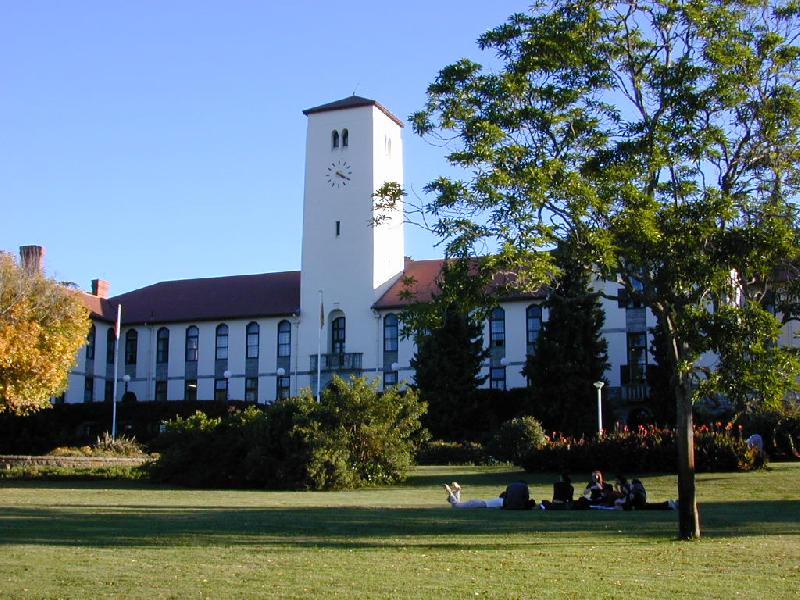
Rhodes University. Some campaigners are suggesting it should also rename.
RHODES MUST STAY
By Jonty Bellink
It is an honour to contribute to the debate via Dante.
Of course Rhodes should stay because I am seeing his words repeatedly pulled out of context and I can do little better than quote from others of those who agree.
-Former South African president F.W. de Klerk weighed in against the “folly” campaign to remove the statue.
-Trevor Phillips, former chairman of the U.K. Equality and Human Rights Commission, called the removal campaign “simultaneously witless, wrongheaded and reprehensible”.
-Former Australian premier Tony Abbott said in a letter to the U.K.’s Independent “It’s a pity that Rhodes was, in many respects, a man of his times. We can lament that he failed to oppose unjust features of his society while still celebrating the genius that led to the creation of the Rhodes scholarships. Rhodes was not a campaigner against racism but many of the scholars who are his legacy have been.”
-Mary Beard, the classicist, wrote for the Times Literary Supplement: “The battle isn’t won by taking the statue away and pretending those people didn’t exist. It’s won by empowering those students to look up at Rhodes and friends with a cheery and self confident sense of unbatterability.”
I write as someone who has read every Rhodes biography and a lot of research, and it is true the earlier works were more measured and less critical. Even then the later works suggest Rhodes can no more be responsible for some of the extreme actions of his paramilitary force than Churchill can be for troops who attacked striking miners. It should be remembered that force was needed to protect his interests in a country without proper law enforcement, Rhodes wanted no anarchy.
There may be those who will accuse me of being racist for telling the truth as written in biographies, so let me reply in advance I am a racial minority researcher myself who has worked with the Commission for Racial Equality. I believe in equality and ending racism, but we do not do this by distorting the facts, insisting “of course” Rhodes was a killer and besmirching the names of anyone who disagrees, and if anyone has incontrovertible evidence that Rhodes was a war criminal, let them bring it forward.
Political correctness is now getting out of hand. It is already at the stage where truth is being twisted and where the mildest criticism of anyone for anything results in the writer being declared a bigot and worse. This is the issue here, freedom of speech and expression. While Rhodes may have not been a paragon of virtue, for example on freedoms, to remove his statue is shameful and wrong. If he did anything wrong, two wrongs do not make a right. He also did a huge amount of good for Oxford. Why are we wanting to deny this? How can we say, all these years on, that this is blood money and should not be accepted? This is potentially juvenile and naïve and I am hopeful those who want that statue removed are none of these things.
Rhodes paid for a lot of building work at Oriel and elsewhere, I am told. Perhaps the statue’s opponents think this should all be demolished too.
I am so happy to see Oxford open its doors to more ethnic minority groups, assuming it does not allow positive discrimination that means it takes less good students. That is the correct response. Tearing down a statue in itself is as pointless as the removal of Saddam’s statue in Baghdad. We want to fix Oxford and make it even better because it is still one of the finest universities in the world; we do not achieve much by caring about symbols. How long before we demolish the university church on the other side of the High Street because it upsets people of different religion and has a very small statue of the devil who as it turns out was not a very nice guy?
Statement on https://www.change.org/p/oriel-college-oriel-college-oxford-university-do-not-remove-the-statue-of-cecil-rhodes
We, the undersigned, call on Oriel College not to give in to the demands of a minority of views to eradicate artefacts of history for the sake of subjective, personal offence. Whilst we recognise the significance of Cecil Rhodes as an imperialist and colonialist, you cannot delete individuals from history, however nefarious you might consider them to be, particularly by today’s standards.
To walk past a century-old statue and consider it a personal ‘violence,’ to argue that the statue represents the university’s values of domination and oppression, lacks any sensibility and is tantamount to both imbecility and hypocrisy. If we allow such expressive views to wield destruction on our history, we set a dangerous precedent. Perhaps we should remove Nelson’s Column for fear of offending the French, or every statue of every monarch whose absolutism might offend our democratic values.
It should be noted that the estate of Rhodes, through a scholarship programme, currently supports students from commonwealth countries, including those from South Africa. Perhaps they’d like to give that tarnished, offensive money back? The statue was erected because Cecil Rhodes was a huge benefactor to the university. We are able to enjoy its world-leading education partly because of his contributions. The statue is in honour of that – it is NOT an endorsement of his views, and if you cannot understand that, then you probably shouldn’t be at university.
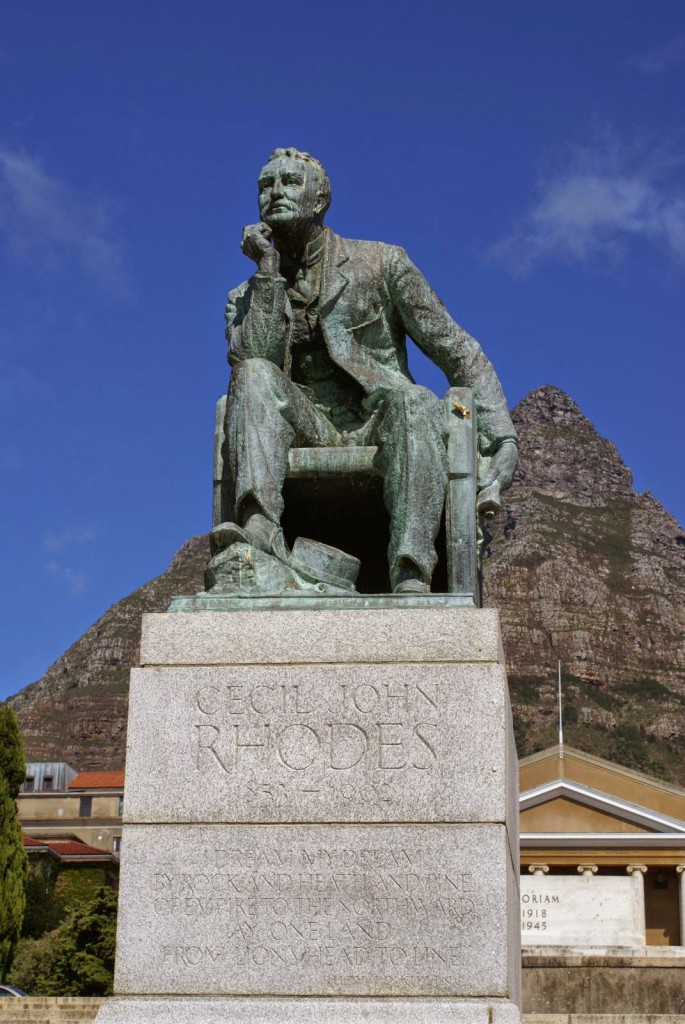
The Rhodes statue removed at the University of Cape Town



